Hail, Caesar! part 8
As Hail, Caesar! hurtles toward its climax, perhaps it’s worth taking a pause to note that this movie, which informs us that Hollywood lies, itself lies about the historical Hollywood.
Eddie Mannix, the reader may be surprised to learn, was a real person, who was the general manager of MGM under the real-life Nicholas Schenck. Mannix did “fix” a lot of MGM’s problems, from getting Clark Gable out of a hit-and-run accident to down-playing Garbo’s lesbianism. The real-life Mannix was also considerably older than Hail, Caesar!‘s, and was dead by 1963. While he was Catholic, there is no indication whatsoever that he was the quiet, soul-searching family man presented here.
While I’ve been saying that Hail, Caesar! takes place in 1951, there isn’t a date presented anywhere in the movie. The official plot description says it takes place in “the early 1950s.” I landed on 1951 primarily because that’s the latest date it’s conceivable to me that a group of communist writers would think up a plot as cockamamie as “kidnapping a movie star.” Baird Whitlock, meanwhile, is starring in a movie clearly modeled on Ben-Hur, which was not released until 1959. 1949’s Samson and Delilah started the “Technicolor Biblical Epic” craze of the 1950s, and Hail, Caesar! ATOTC seems to be a mashup of Ben-Hur and 1951’s Quo Vadis.
So, if 1951 is our benchmark, then Burt Gurney, who is clearly inspired by Gene Kelly, is making a service comedy-musical closely modeled on On the Town (1949). Kelly’s 1951 picture was An American in Paris. DeeAnna Moran, meanwhile, is obviously modeled on Esther Williams, who, like DeeAnna, had a complicated romantic life and made an “aquatic picture” titled Neptune’s Daughter in 1949 and Million Dollar Mermaid in 1952, not to mention Jupiter’s Daughter in 1955 and Athena in 1954.
But, as noted earlier, a 20-something singing cowboy would be seem very old-hat to 1951 audiences, so Hobie Doyle is a puzzling anachronism. Even more so, his date at the Lazy Ol’ Moon premiere, Carlotta Valdez, is clearly modeled on Carmen Miranda, who was 41 years old in 1951, long past her peak and four years away from her untimely death. It seems that Hobie and Carlotta belong to a decade of movies set at least a decade earlier than Whitlock and Gurney. It’s as though Eddie Mannix’s entire career is being packed into one night.
In any case, the screenplay for Hail, Caesar! has reached what amateur screenwriters refer to as “the dark night of the soul” beat of Act III, and is here dramatized with a scene of Eddie, grasping a rosary, praying at his desk at Capitol Pictures, walking the “empty streets of Rome” and, finally, contemplating at the foot of Golgotha, all while Hobie Doyle chases after Burt Gurney to see where he’s going with the briefcase full of money. Eddie, in this moment, becomes the troubled father of both a family and a studio, while Hobie becomes a kind of surrogate son to Capit(a)ol, who has literally abandoned his date in order to recover some of his studio’s (petty) cash.
Hobie doesn’t recover Eddie’s cash, but he does find Baird Whitlock, alive and well, reclining in Burt Gurney’s living room, sipping a martini (for it is Gurney’s house to which the communists have taken him). For a man who’s been abducted by angry insurgents, Baird is pretty relaxed — transformed, even, by his encounter with Marxism. He has, as far as he’s concerned, an epiphany, about class, the value of work and the hidden forces that shape our lives. Hobie, for his part, can only squint his eyes and whisper “So. It’s commies.” For him, communism is the opposite of “what works.” Capitalism, and Capitol Pictures, has brought him the world.
Burt Gurney, looking like an idiot Washington crossing the Delaware, clutches his lapdog Engels as his communist writer friends row him out to sea, where he meets a Russian submarine. He is, apparently, defecting. In one of the odder moments of Hail, Caesar!, the movie and the movies-within-the-movie merge. The climax of Burt Gurney’s journey takes place on an obviously fake ocean with an obviously fake submarine beneath an obviously fake moon in an obviously fake sky, and he makes an obviously fake leap from his boat to the side of the sub. This is not to say that Gurney’s journey (sorry) is not real, but perhaps that Gurney can only perceives his life in terms of movies. To him, he’s not “defecting to Russia” but is instead starring in a romantic movie about a man seeking his destiny. (The beat is also, of course, a callback to his other big scene, where he does a comical musical number about sailors going to sea.)
The communist writers, in a display of selflessness, give the ransom money over to Gurney to give to “the cause.” Unfortunately, Gurney’s communist-lapdog Engels chooses that moment to leap into his arms, and he drops the money into the ocean. And that, we are left to imagine, is why the communists were never able to take over America; Burt Gurney chose a dog over money, and The Cause found itself $100,000 short.
Driving back to Hollywood, Baird Whitlock realizes how late it is and how much trouble he’s in — not from Eddie, mind you, but from his wife — and asks to be dropped off at the Beverly Hills hotel. As they drive, they encounter a passel of police cars howling back toward Burt Gurney’s house — Eddie and his secretary Natalie have solved the mystery of Baird Whitlock’s disappearance and have sent the cops. Unbeknownst to Eddie, the police were unneeded — all Eddie needed to preserve his capital was Hobie Doyle.
Another morning dawns at Capitol Studios, starting with a production assistant taking lunch orders from the cast. At the feet of (the actor playing) the crucified Jesus, he asks “Are you a principle or an extra?” “I think I’m a principle,” squeaks the (off-camera) Jesus.
Baird Whitlock reports to Eddie Mannix’s office, eager to tell him about his conversion at the hands of the communists. “It’s all in a book,” he enthuses, “Called Kapital, with a ‘K.'” He goes on to tell Eddie that Capitol Pictures is only a tool of the system, “serving up lollipops” to preserved the status quo, that there is no artistic or spiritual dimension to what anyone at the studio does. Eddie listens patiently until Whitlock badmouths Nick Schenck as a “fatcat,” not realizing that he has insulted Eddie’s Caesar, his earthbound god. He smacks Whitlock around, multiple times, and lays on him some hard truths about capital and its prerogatives, telling Whitlock that if he ever badmouths Mr. Schenck or the studio again, Eddie will have him arrested for colluding in his own abduction. We see that Eddie has kept a lot of actors out of jail in his life, and Whitlock’s bad behavior is the straw that has broken Eddie’s back: he is done babysitting for a spoiled brat. Moreover, and more importantly, he reminds Whitlock of his purpose: he is an actor, his purpose is to act. He has a job, nay, a duty, to the studio, to the audience, to the movie, and to the other crew members, the director and the electricians and the clapper, to do as good a job as possible. Being a stern father, he slaps Whitlock around, but, having delivered his lesson, being a loving father, he reminds Whitlock of his role: “Go out there and be a star.” And that’s what show business is all about, Charlie Brown. It’s a business, to be sure, but it’s staffed by people: hard-working people, dishonest people, flawed people, human people, all offering up their holy and broken hallelujahs.
Having solved his major crisis, Eddie heads, once again, to confession. On his way to his car, his secretary Natalie informs him that DeeAnna Moran has married Joe Silverman and has sent flowers. He is then beset by Thora Thacker, who is intent on running her story about Baird Whitlock’s early days of sodomy — Thora can barely contain her delight as she says the word, evoking, naturally, the destruction of Sodom and Gomorrah by an angry God — with Laurence Laurentz. This story, she’s positive, is going to put her in the big leagues of journalism. Eddie, however, has news for Thora: her source on the Baird Whitlock Sodomy Story is Burt Gurney, who has been revealed to be the leader of a communist cell, which the police have just smashed. Eddie, the God-fearing capitalist, easily outmaneuvers godless communists, but gives DeeAnna’s flowers to Thora anyway — he’s not a vengeful man, he’s a pragmatist, and Thora, he knows, is not a heretic, but only a person trying to do her job.
As Eddie goes to confession, Baird Whitlock has his big scene at the foot of the crucified Jesus. Acting as hard as he can, he says that he encountered Jesus earlier, at a well. “I sought to drink first, before the slaves, whose thirst was far greater than my own.” That’s Whitlock, whose journey of the past 24 hours matches Autolocus Antoninus’s exactly. He was a movie star, who saw himself as above the mere peons who work on his movies. “But this man was giving water to all, he saw no Roman, he saw no slave. He saw only men, weak men, and gave succor.” That, I think, would make Eddie Jesus, the man who sweats every detail of the studio and values every employee, from the movie star to the messenger. It’s certainly not the communists, who, despite their efforts to induct Whitlock into their cause, could see the world only in terms of Romans and slaves.
Autolocus Antoninus says that he Jesus saw his sin, which is certainly true of Whitlock and Eddie, but says that he saw “no reproach in his eyes, but only love.” Well, if Whitlock didn’t see any reproach in Eddie’s eyes while he was slapping him around his office he wasn’t paying attention, but it’s true that Eddie, ultimately, expressed his love for Whitlock before sending him out to the set to “be a star.”
As Whitlock heads into the meat of his Jesus speech, everyone on the set, the PA, the gaffer, the electrician, the script girl, and, yes, the clapper, is visibly moved. “Why shouldn’t God appear in this form?” asks Antoninus, “Among these strange people, in this sun-drenched land?” Eddie, or, perhaps, Capitol itself, Antoninus suggests, is here to bring a “new truth, a world beyond that which we can see. A truth told not in words but in light,” referring, blatantly, to the world of motion pictures, a truth that is a lie, a lie that nevertheless cannot help but tell the truth.
“A truth that we could see if we had but — ” says Whitlock, and then flubs the line, stumbling, of course, on the word “faith.” If I was pressed to impose a “message” on Hail, Caesar! I would say that it wishes to tell us that motion pictures, and the multi-billion-dollar industry that brings them to us, is an instrument of the divine, in spite of — or perhaps because of — the flaws of the people who run it. Great things are possible in motion pictures, even the most basely motivated motion pictures, because the divine exists in us all.
On the other hand, the Coen Bros are Jews, and have already made one great religious movie, A Serious Man, so it’s also possible that Hail, Caesar! is a movie about how Christians are delusional and can be easily manipulated by images and surface riches.
(For what it’s worth, George Clooney is perfect casting as Baird Whitlock, being one of our few remaining movie stars, and also one of our businesses most conscientious of filmmakers. Clooney, hundreds of stories attest, is an anti-star movie star, a star who constantly, habitually, considers the feelings and positions of whatever crew he’s working with. Given a free moment on set, Clooney will start up a conversation with literally any member of the crew, with a politician’s ease and comfort, treating everyone as an equal, making that crew member feel like the most interesting person in the world.)
We come back to Eddie where we first found him, in the confessional. His priest, exhausted, protests that Eddie confesses entirely too much. “You’re not that bad,” he sighs. Eddie lists his sins: he snuck two cigarettes and was late for dinner, and “struck a movie star in anger.” Even the priest, begrudgingly, agrees that striking a movie star is a sin, and sentences Eddie to “five Hail Marys.” Which, in an exceedingly subtle way, defines Eddie’s split. While he spends his days toiling for Caesar, making a movie ironically titled Hail, Caesar, A Tale of the Christ, he is able to get through his days by hailing Mary.
Eddie then asks the priest some job advice. If something is easy to do, he asks, is it wrong to do it? Running the studio is hard, he says, but it feels “right.” The priest tells Eddie, “The inner voice that tells you it’s right, it comes from God.”
His decision made, Eddie heads back to the studio for another day of managing crises. He has one final conversation with his secretary Natalie, who lays out all the day’s predicaments. Eddie takes each calamity in stride, making decisions on the fly, confident and serene in his capabilities and loving his job. He turns down Cuddahy, Lockheed and “the future” (having already destroyed the other future, the communist plot to take down Capitol). “The story of Eddie Mannix will never end,” says the narrator, “For it is written in light everlasting.” That light, the Los Angeles light that brought filmmakers to southern California in the first place, beams down on the Capitol Pictures water tower, which reads, simply, “BEHOLD.”
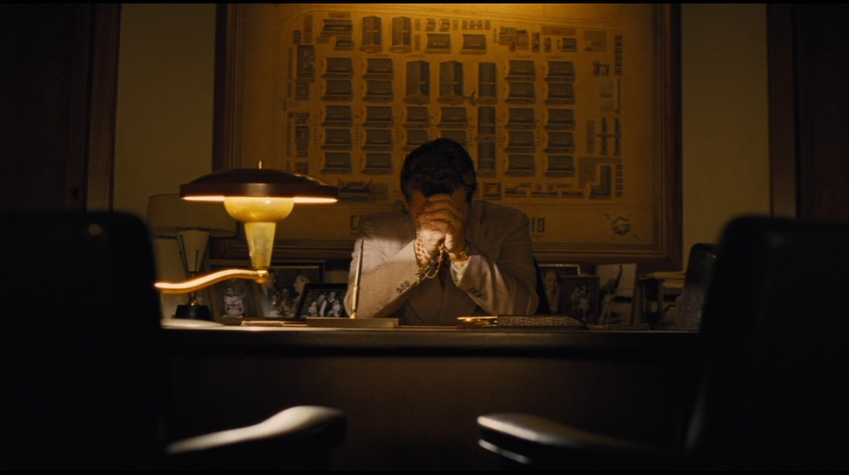
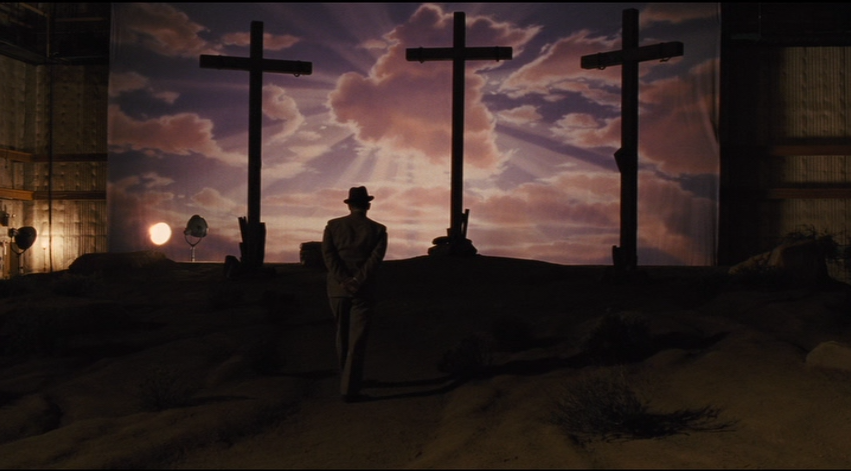
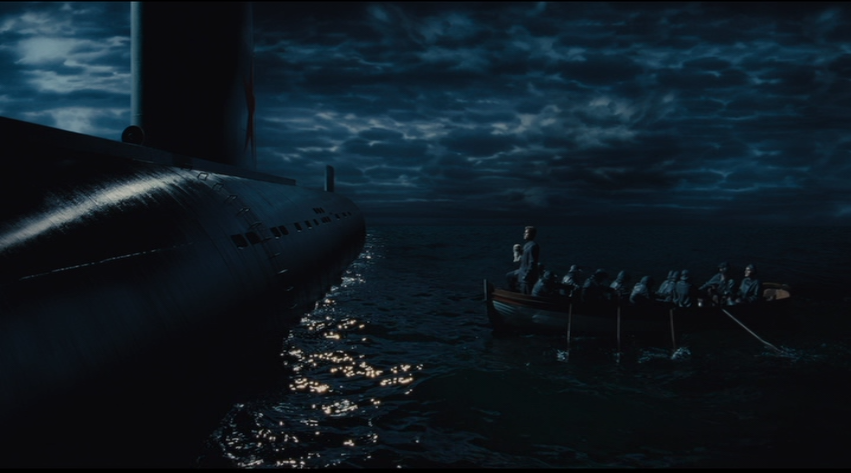
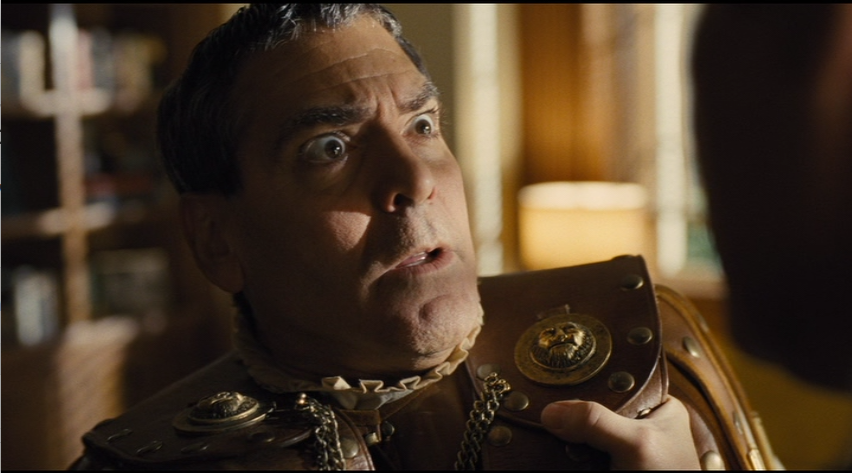
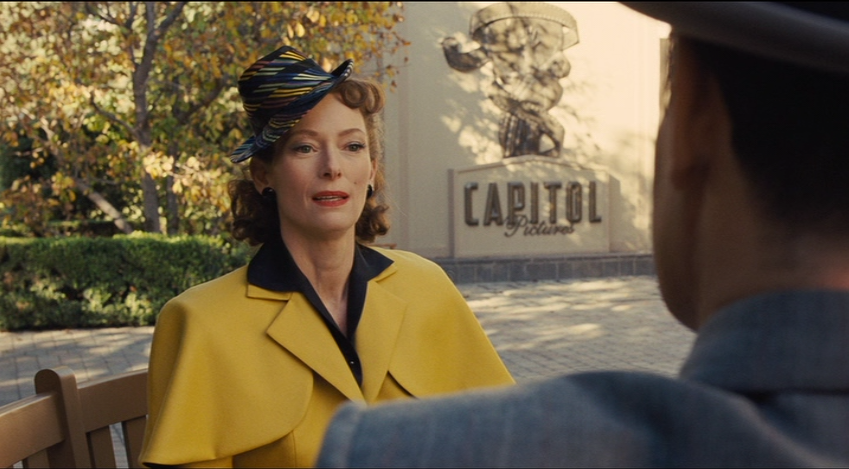
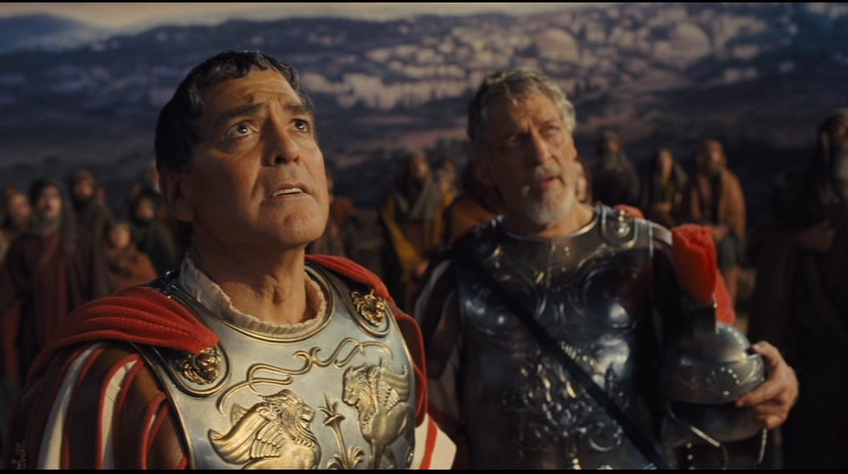
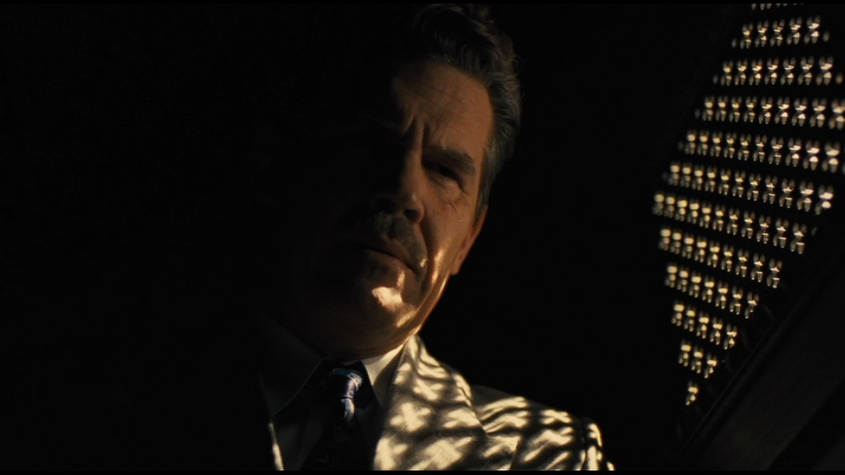
I found these pieces really interesting and entertianing, and they pointed out an embarrassing amount of detail that I missed while watching the film. Thank you for writing them.
Thank you for writing about these Coen movies. I always enjoy how you break them down.
Like all the Coen’s movies it gets richer on rewatching, there’s a terrific audio gag which runs through the movie when they mention Whitlock’s early movie ‘On Wings As Eagles’ which I missed when watching it at the cinema.
‘On Wings As Eagles’, is paraphrased from Isiah 40:31 and essentially states that those who have faith will be strong. Given that Mannix spends his time rescuing people who have succumbed to pleasures of the flesh or drink or drugs it seems neatly ironic that it’s his mantra for life but also the vehicle which could ruin his main charge’s career. and undermine everything he’s worked for.